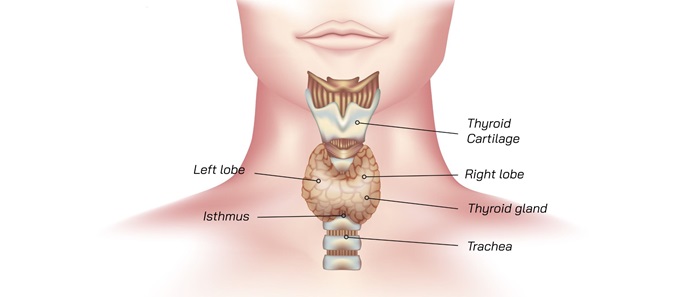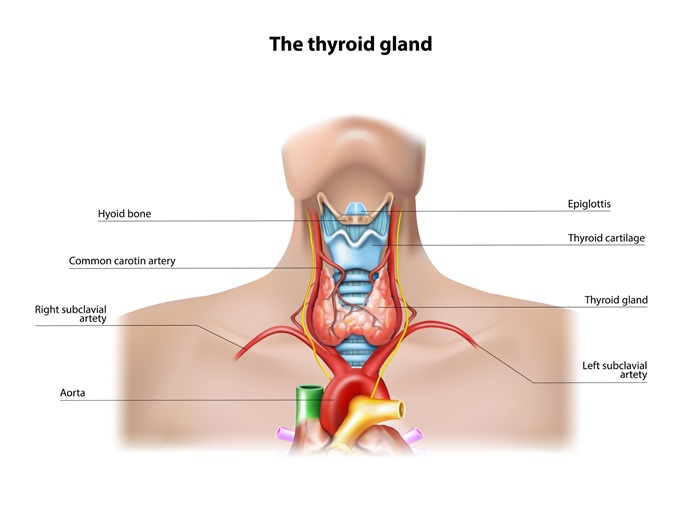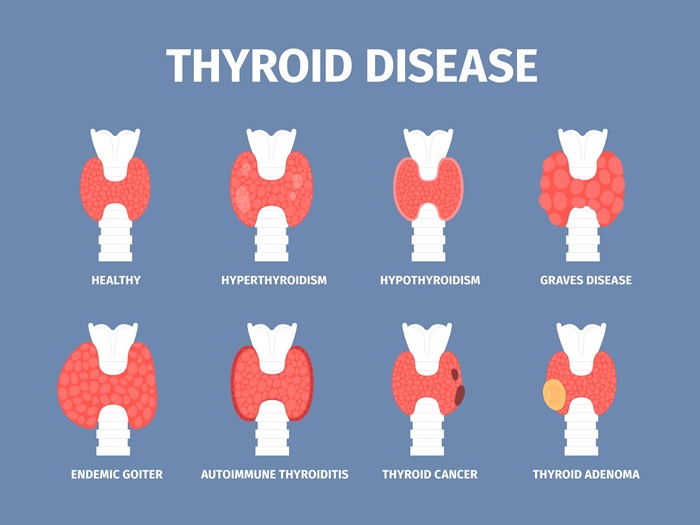The thyroid is a butterfly-shaped gland located at the base of your neck. It plays a crucial role in regulating your body’s metabolism, energy levels, and hormone balance. Thyroid disorders, such as underactive thyroid (hypothyroidism), hyperthyroidism, and autoimmune conditions like Hashimoto’s disease, can significantly impact your health. Early recognition of thyroid symptoms, routine thyroid gland tests, and proper treatment are vital for managing these conditions.
The thyroid is a butterfly-shaped, small gland located just below your Adam’s apple. It is part of the endocrine system which is a network of glands that produce and regulate hormones to control essential body functions. Despite its small size, the thyroid plays an important role in your overall health by producing hormones that regulate your metabolism - the process of converting the food you eat into energy your body needs to function.
Your thyroid’s primary function is to control the speed of your, also known as your metabolic rate. This involves determining how quickly your body burns calories and uses energy. These functions are vital because every cell in your body depends on energy to perform its tasks, from supporting brain activity to aiding muscle movements.
When the thyroid doesn’t function properly, it can disrupt the delicate balance of hormones your body needs, leading to widespread effects on your health and well-being.

The thyroid is located in the front of your neck, just below the Adam’s apple. Shaped like a butterfly, it has two lobes on either side of the trachea, connected by a thin strip of tissue called the isthmus. Despite its small size, this gland has a massive impact on your body’s overall function.
The thyroid consists of two main lobes:
These lobes are connected by the isthmus, a small bridge of tissue that allows them to work together. Surrounding the thyroid are four tiny glands called the para thyroid glands, which regulate calcium levels in the blood.

The thyroid plays a central role in maintaining your body’s energy balance and regulating vital physiological processes. This is accomplished through the production and release of specific hormones that directly affect how your body uses and stores energy, controls its temperature, and maintains proper organ function. Let’s break down the key hormones produced by the thyroid and their functions:
Together, these hormones ensure proper energy balance, temperature regulation, and organ function.
Thyroid disease refers to any condition that impairs the proper function of the thyroid gland. These disorders occur when the gland produces either too much or too little hormone, disrupting your body’s balance.

Below is an overview of some common thyroid diseases.
Hyperthyroidism (Overactive Thyroid): Hyperthyroidism occurs when the thyroid gland produces too much of the T3 and T4 thyroid hormones. This causes the body’s metabolism to speed up, which can lead to issues like weight loss, rapid heart rate, nervousness, and excessive sweating. Essentially, the body is running at an accelerated pace.
Hypothyroidism (Underactive Thyroid): Hypothyroidism, on the other hand, occurs when the thyroid doesn’t produce enough thyroid hormones. This leads to a slowing down of the body’s metabolic processes. People with hypothyroidism may experience fatigue, weight gain, cold intolerance, and dry skin, among other symptoms. The body’s functions become slower and less efficient in this condition.
Graves' Disease: Graves' disease is an autoimmune condition where the immune system mistakenly attacks the thyroid gland. As a result, it produces too many hormones, often leading to hyperthyroidism. It can also cause other symptoms, such as bulging eyes, which is characteristic of this disease.
Endemic Goitre: An endemic goitre is an enlargement of the thyroid gland caused by iodine deficiency, which is more common in certain geographical areas where iodine-rich foods are scarce. This condition leads to the thyroid growing larger in an attempt to compensate for the lack of iodine needed to produce thyroid hormones.
Autoimmune Thyroiditis (Hashimoto's Disease): Hashimoto's disease is an autoimmune disorder where the immune system mistakenly targets and damages the thyroid, often resulting in an underactive thyroid (hypothyroidism). It is one of the most common causes of underactive thyroids. People with Hashimoto’s may experience symptoms like fatigue, weight gain, and depression.
Thyroid Cancer: Thyroid cancer occurs when abnormal cells in the thyroid gland start to grow uncontrollably. Though it is relatively rare, it is becoming more commonly diagnosed. Most types of thyroid cancer are treatable, especially when detected early.
Thyroid Adenoma: A thyroid adenoma is a non-cancerous (benign) tumour that forms in the thyroid gland. While it may not always cause symptoms, it can sometimes affect thyroid function, leading to conditions like hyperthyroidism if the tumour produces thyroid hormones.
The thyroid plays a key role in regulating many essential functions throughout your body. Its hormones influence a variety of physiological processes, and any imbalance in thyroid hormone levels can affect the following:
The thyroid directly controls your metabolism, which is the process by which your body converts the food you eat into energy. Thyroid hormones (T3 and T4) determine how quickly or slowly this energy conversion occurs. An overactive thyroid (hyperthyroidism) speeds up metabolism, causing weight loss and increased energy, while an underactive thyroid (hypothyroidism) slows down metabolism, which can lead to weight gain and fatigue.
Your thyroid has a significant impact on heart function. It helps regulate your heart rate, blood pressure, and the overall rhythm of your heart. An overactive thyroid (hyperthyroidism) can cause the heart to beat faster or irregularly, leading to palpitations or arrhythmias. Conversely, an underactive thyroid (hypothyroidism) may lead to a slower heart rate and increased risk of high blood pressure.
Thyroid hormones also influence the digestive system, affecting how quickly food moves through your intestines. A normal level of thyroid hormones helps to maintain healthy digestion. In cases of hyperthyroidism, food moves too quickly, which can cause diarrhoea. With hypothyroidism, digestion can slow down, leading to constipation.
The thyroid plays an essential role in reproductive health, particularly in regulating the menstrual cycle and fertility. Thyroid imbalances can lead to irregular periods or heavy menstrual flow in women. An overactive thyroid (hyperthyroidism) can result in lighter periods or even the cessation of periods, while hypothyroidism can lead to more frequent and heavier periods. Both conditions can also impact fertility and the ability to conceive.
The thyroid directly controls your metabolism, which is the process by which your body converts the food you eat into energy. Thyroid hormones (T3 and T4) determine how quickly or slowly this energy conversion occurs. An overactive thyroid (hyperthyroidism) speeds up metabolism, causing weight loss and increased energy, while an underactive thyroid (hypothyroidism) slows down metabolism, which can lead to weight gain and fatigue.
When your thyroid produces too much of the hormone’s thyroxine (T4) and triiodothyronine (T3), your metabolism speeds up. Early signs of hyperthyroidism include:
Weight Loss – Even if you eat more, you might lose weight due to an accelerated metabolism.
Rapid Heartbeat (Palpitations) – Fast or irregular heartbeat is a common symptom.
Nervousness or Anxiety – Feeling jittery, anxious, or having difficulty relaxing are signs that your body’s systems are running at high speed.
Increased Sweating – Excessive sweating or feeling unusually hot, even in cooler environments, is common.
Fatigue– Although hyperthyroidism causes an increase in energy, it can also lead to extreme fatigue and muscle weakness due to the body’s overactivity.
Tremors – Fine shaking or tremors in the hands are a common early symptom.
Sleep Problems – Difficulty falling or staying asleep due to a constantly elevated metabolic rate.
Hypothyroidism occurs when your thyroid produces insufficient amounts of thyroid hormones, slowing down your metabolism. The early symptoms of hypothyroidism may include:
Fatigue and Weakness – Feeling constantly tired, sluggish, or weak even after a good night’s sleep is one of the most common early signs.
Weight Gain – Unexpected weight gain, even if your diet and exercise habits haven’t changed, can occur due to a slowed metabolism.
Cold Sensitivity – Feeling unusually cold, especially in your hands and feet, can be an early warning sign.
Dry Skin and Hair – Hypothyroidism often causes dry, rough skin and brittle hair that breaks easily.
Constipation – Slow digestion and constipation are common early symptoms of an underactive thyroid.
Depression – A feeling of sadness, depression, or a lack of motivation can be a result of an underactive thyroid affecting brain function.
Memory Problems – Difficulty concentrating, brain fog, or memory lapses may occur due to the slowed metabolism affecting cognitive function.
Puffy Face – Puffiness, especially around the eyes, is a visible sign of hypothyroidism.
1. Graves' Disease (Hyperthyroidism):
2. Hashimoto’s Disease (Hypothyroidism):
Some additional early signs of thyroid issues may include:
Thyroid diseases can result from:
To check how well your thyroid is working, doctors use different tests. These tests help identify if you have thyroid problems and what might be causing them.
Blood Tests
Imaging Tests
Biopsy for Thyroid Nodules
If doctors find a lump in your thyroid, they might do a biopsy. This involves using a needle to take a small sample of the lump to check if it’s cancerous.
Hypothyroidism Treatment
Hyperthyroidism Treatment
Diet for Thyroid Patients
Book an appointment with a doctor if you experience:
Can a Person Live Without a Thyroid?
Yes, individuals can live without a thyroid gland. Hormone replacement therapy ensures the body gets enough T4 and T3 for normal functioning.
How to decrease thyroid?
To manage thyroid health, adopt a healthy diet, engage in regular exercise, avoid smoking, and ensure sufficient vitamin D levels.
Is thyroid a serious problem?
An overactive thyroid, which produces excess hormones, causes your body to burn energy too quickly, leading to hyperthyroidism. If left untreated, it can result in serious issues, including heart problems, bone loss, and more.
Is thyroid the cause of hair fall?
Both severe and prolonged cases of hypothyroidism and hyperthyroidism can lead to hair loss.
Does thyroid affect periods?
An imbalance in thyroid hormones can lead to changes in menstrual cycles, causing periods to become irregular, very light, or heavy. In some cases, thyroid disease can stop menstruation altogether, known as amenorrhea, and may also affect other glands like the ovaries.